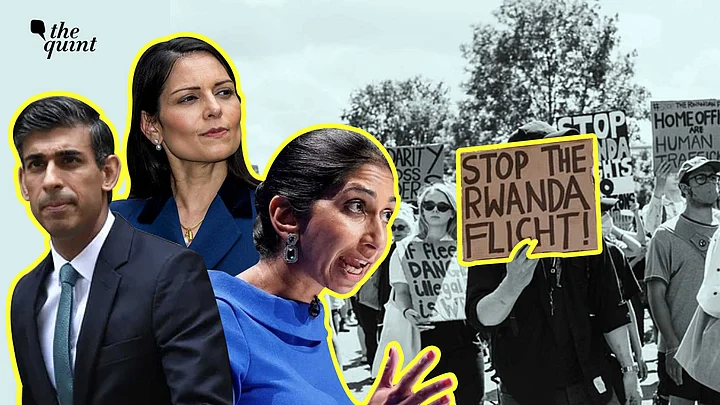It’s one of the more bizarre policy initiatives of the British government.
For a couple of years, they have been working on a plan to parcel off illegal immigrants to the small central African nation of Rwanda. The aim is to discourage potential asylum seekers from making the deeply hazardous journey from France in small boats organised by criminal gangs.
But no migrant to Britain has yet been sent against their will to Rwanda – and it’s now possible that none will ever make that journey. The Supreme Court on Wednesday unanimously decreed that deporting asylum applicants to Rwanda is unlawful. As a result, Rishi Sunak’s key initiative to address the politically charged issue of illegal immigration is in ruins.
The Supreme Court didn’t rule that any forced resettlement of asylum seekers to a third country was against the law.
It simply decreed that Rwanda, which has an indifferent human rights record, is not a safe country because there’s a real possibility that genuine refugees might be returned to the country from which they had fled.
What the Government Hoped to Achieve With the Plan
The Rwanda policy was, from the start, deeply controversial. The British government came up with a deal with the Rwandan authorities: the African nation would accept asylum seekers and consider them for permanent settlement and would in return receive financial support. Put it another way, any refugees heading from Britain to Rwanda would come with a handsome dowry.
The British government argues that Rwanda is stable and well-placed to offer refuge for those fleeing from autocratic regimes. The intention has been to send perhaps a few thousand asylum seekers to central Africa, most of them single men. But the government’s hope was that publicity about these deportations would dissuade asylum seekers from spending thousands of dollars on the deeply dangerous sea crossing to Britain’s southern coast.
After all, if your aim is to start a new life in London or Liverpool, then ending up in an African nation where you have no contacts, no relevant language skills, and not much hope of prospering, is not an attractive option.
Immediately after the Supreme Court judgment, Rishi Sunak insisted that he was still determined to ‘stop the boats’. He’s planning to renegotiate the deal with Rwanda to try and meet the judges’ objections. He has announced that he will bring in emergency legislation to sidestep the judges’ ruling. And if necessary, he says he will act in defiance of the European Convention on Human Rights. He still expects the first deportation flights to Rwanda to take off in the next six months.
This feels perverse – a bit like a hardened gambler doubling down on what’s been shown to be a losing strategy. Sunak’s political difficulty is that he has made ‘stopping the boats’ one of his main political promises and he doesn’t have an alternative plan to achieve that aim.
Principle of Offering Asylum is Long Established in Britain
The sight of hundreds of illegal migrants landing on beaches on the south coast, or being rescued at sea from over-crowded dinghies, has angered public opinion. Hundreds of thousands of migrants come legally to the United Kingdom every year; but the thousands of illegal migrants – about 27,000 have crossed in small boats so far this year - are widely seen as jumping the queue and undeserving of sympathy.
Once in Britain, these illegal migrants usually claim asylum and then spend months or years in hostels waiting for their asylum applications to be considered. Even if those claims are rejected, it’s not always easy to send the migrants back home.
While some of those seeking asylum come from countries where it’s easy to imagine there’s a risk of persecution – from Iran, Afghanistan, Syria, or Eritrea, for example – others are from nations such as Albania or indeed India where that risk is nothing like so evident. Some commentators argue that these would-be refugees are really economic migrants who are heading for Britain because they speak a little English and can claim welfare benefits.
But the principle of offering asylum to those facing political or other forms of persecution is long established in Britain. Advocates for refugee rights insist that Britain can’t simply out-source its responsibility to consider asylum claims. Underlying this heated debate is the issue of whether Britain remains an open and tolerant nation or one that is increasingly inward-looking and suspicious of outsiders.
No one has escaped the irony that the Rwanda policy has been championed by politicians who are themselves the children or grandchildren of migrants. Priti Patel (of Gujarati heritage) came up with the scheme when she was Home Secretary, and it was warmly embraced by her successor Suella Braverman (whose forbears come from Goa and Tamil Nadu) who was sacked earlier this week for being too outspokenly right-wing, including talking about an immigrant ‘invasion’.
As Prime Minister, Rishi Sunak (of Punjabi ancestry) has made the Rwanda scheme the cornerstone of his plan to turn back the tide of illegal immigrants. It’s one of his principal pledges ahead of a general election expected in about a year’s time.
Sunak has had a grim few months. The opinion polls have been solidly against him – some of his former cabinet colleagues have forsaken him – his predecessor, Boris Johnson, is making problems for him – and now the judges have come out against him.
He must be hoping that his political luck will turn. But when a government is on the slide, it usually hits the ground with a thud. And then it’s Rishi Sunak who will be looking for a new home.
(Andrew Whitehead is a former BBC India correspondent and also reported on British politics for the BBC. This is an opinion article and the views expressed are the author's own. The Quint neither endorses nor is responsible for them.)
(At The Quint, we question everything. Play an active role in shaping our journalism by becoming a member today.)
